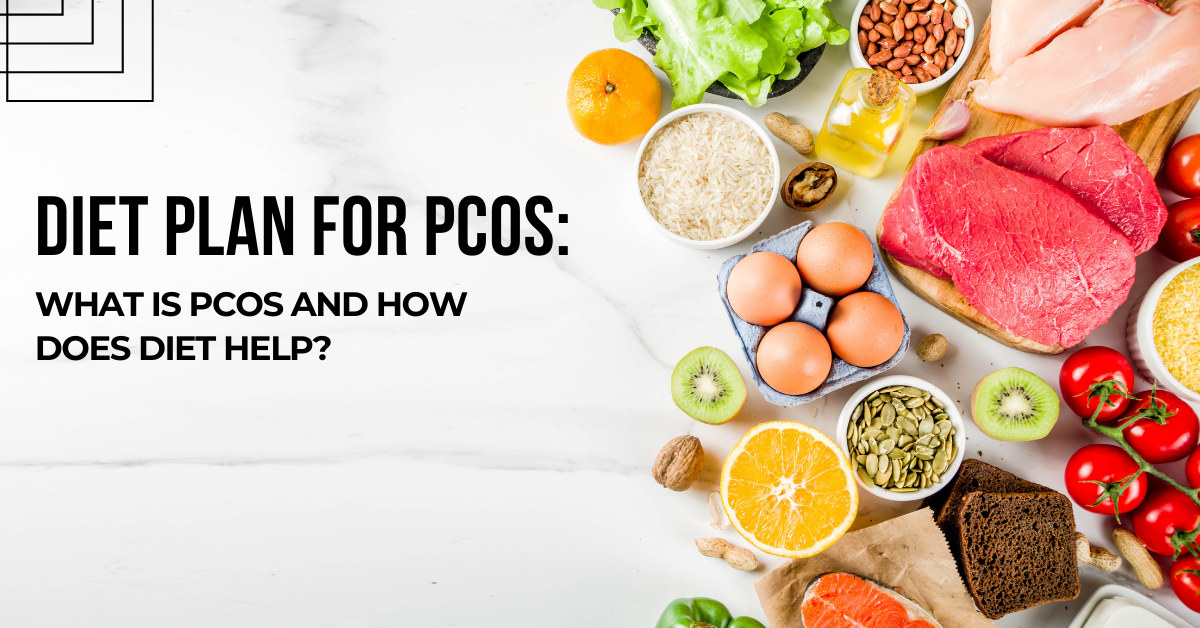What is PCOS and How Does Diet Help?
PCOS, or Polycystic Ovary Syndrome, is a hormonal disorder that affects a woman’s ovaries. This can cause symptoms like irregular periods, acne, and excess hair growth. While there’s no cure for PCOS, finding the right diet plan for PCOS is crucial for managing it. A healthy diet, along with exercise and sometimes medication from your doctor, can help you with weight loss in PCOS, balance your hormones, and improve your overall health over time.
Long-Term Health Risks: PCOS is associated with an increased risk of certain health conditions, such as type 2 diabetes, heart disease, and endometrial cancer. Early diagnosis, management, and lifestyle modifications can help reduce these risks.
PCOS and Fertility: PCOS can impact fertility, but it doesn’t mean pregnancy is impossible. Discuss your fertility concerns with your doctor to explore options like lifestyle changes, medication, or assisted reproductive technologies.
Emotional and Psychological Impact: PCOS can have a significant emotional and psychological impact. Support groups, counselling, and stress management techniques can help you cope with these challenges.
Polycystic ovary syndrome (PCOS) is a significant health concern, affecting an estimated 8-13% of reproductive-aged women. Alarmingly, up to 70% of affected women remain undiagnosed worldwide. PCOS stands as the most common cause of anovulation (lack of ovulation) and ranks as a leading cause of infertility in women.
Symptoms of PCOS
- Irregular or absent periods: This is a key symptom of PCOS. Periods may be infrequent, unusually heavy, or last for prolonged periods.
- Weight gain and difficulty losing weight: Insulin resistance common in PCOS can make weight management challenging.
- Excessive hair growth (hirsutism): This refers to hair growth in typically male patterns, such as on the face, chest, back, and abdomen.
- Skin conditions: Acne, oily skin, and skin tags are often experienced with PCOS.
- Hair loss (alopecia): Hair thinning on the scalp or male-pattern hair loss can occur.
- Sleep problems: Difficulty sleeping or sleep apnea may be linked to PCOS.
- Reduced fertility: PCOS can make it harder to conceive naturally.
Not every person with PCOS will experience all of these symptoms, and the severity can vary. If you suspect you may have PCOS, consult a doctor for proper diagnosis and guidance.
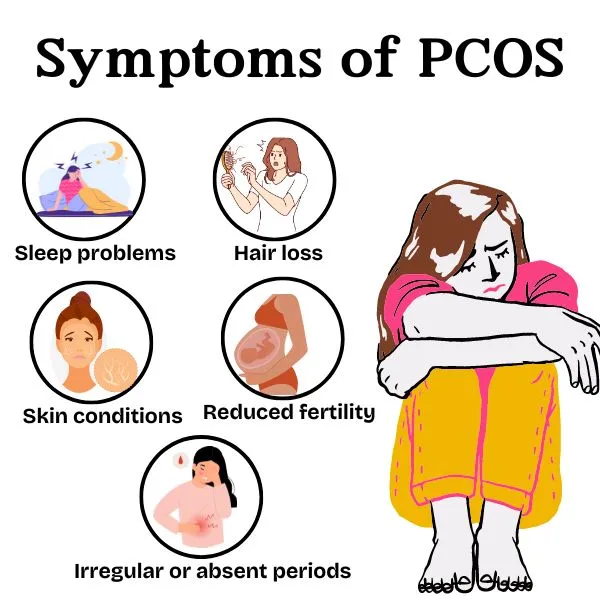
Precautions for PCOS
- Keep Your Weight in Check – Maintaining a healthy weight is crucial in managing PCOS. Excess weight can exacerbate the symptoms and increase the risk of insulin resistance. Regular exercise and a balanced diet can help in weight management.
- Follow Your Doctor’s Advice – Regular consultations with your healthcare provider are essential. They can provide personalized advice, medication, and treatment plans tailored to your specific condition.
- Avoid High Carbohydrates – High carbohydrate intake can lead to insulin spikes, which may worsen PCOS symptoms. Opt for complex carbs with a low glycemic index to keep your blood sugar levels stable.
- Increase Your Protein Intake – Protein helps in managing hunger and can aid in weight control. Incorporate lean proteins such as chicken, fish, beans, and legumes into your diet.
- Limit Your Dairy Intake – Some studies suggest that dairy might influence insulin and androgen levels, potentially aggravating PCOS symptoms. Consider moderating your dairy consumption if you notice it affects your condition.
- Don’t Let Your Cortisol Get Angry – High stress levels can lead to increased cortisol, which can impact PCOS. Practice stress-relief techniques such as yoga, meditation, or hobbies to keep your cortisol levels in check.
- Limit Your Weekend Parties – Excessive alcohol and late nights can disrupt your hormonal balance. Try to limit such activities to maintain a regular sleep schedule and reduce alcohol intake.
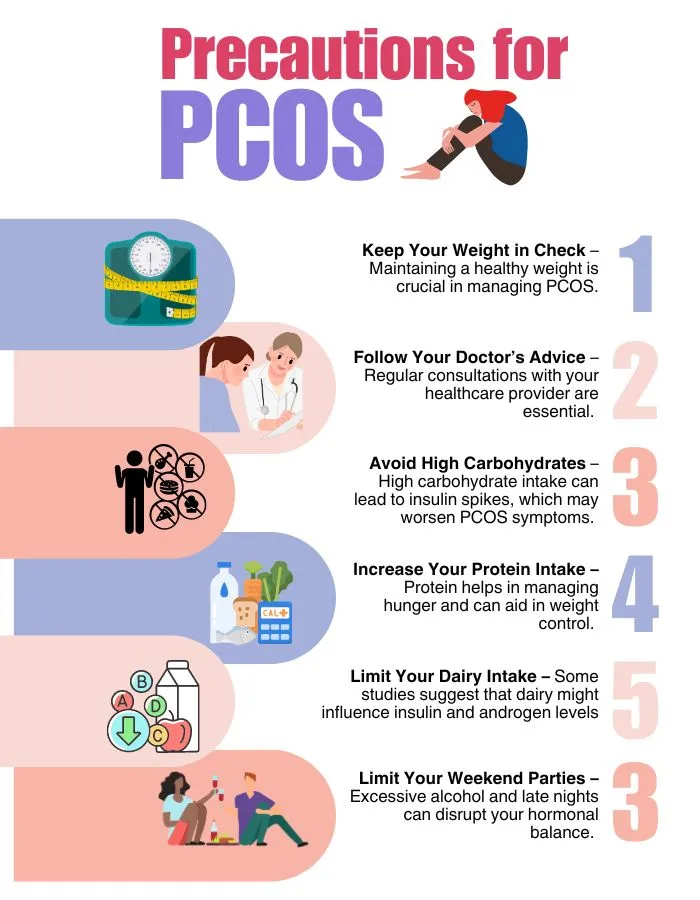
7 Days Diet Plan for Pcos Patients
Diet for Sunday
| Meal Time | Food |
|---|---|
| Breakfast | A big bowl of any fruit. |
| Lunch | Vegetable pulao made with rice, cucumber and raita (low-fat yogurt). |
| Dinner | A large bowl of mango cucumber salad and lauki tomato garlic soup. |
Diet for Monday
| Meal Time | Food |
|---|---|
| Breakfast | Vegetable paneer sandwich with whole grain bread and green chutney |
| Lunch | One cup of brown rice with gheeya tuar/chana dal, beetroot raita (low-fat yogurt), and a small salad. |
| Dinner | One or one-and-a-half paneer bhurji sandwich with whole grain bread, cucumber, and kakdi. |
Diet for Tuesday
| Meal Time | Food |
|---|---|
| Breakfast | One or two moong dal cheela topped with paneer and capsicum served with chutney. |
| Lunch | One cup of dal, one cup of brown rice, cucumber raita (low-fat yogurt), and salad. |
| Dinner | Tofu curry with half a cup of brown rice and mashed boiled sweet potatoes with green chutney. |
Diet for Wednesday
| Meal Time | Food |
|---|---|
| Breakfast | Large besan chilla with chutney. |
| Lunch | Paneer curry with one ragi roti, boondi raita (low-fat yogurt), and salad. |
| Dinner | Repeat the lunch menu with one ragi roti. |
Diet for Thursday
| Meal Time | Food |
|---|---|
| Breakfast | Rava uttapam with coconut chutney. |
| Lunch | Kadhi with a small bowl of brown rice, lauki sabji, and salad. |
| Dinner | Paneer sandwich with whole grain bread and a bowl of sabzi or dal. |
Diet for Friday
| Meal Time | Food |
|---|---|
| Breakfast | 2-3 idlis with coconut chutney. |
| Lunch | Two thin wheat and besan mix rotis with matar paneer (low-fat paneer), beans sabji, and boondi raita. |
| Dinner | Repeat the lunch menu with one roti. |
Diet for Saturday
| Meal Time | Food |
|---|---|
| Breakfast | Uttapam topped with paneer and vegetables, served with coconut chutney. |
| Lunch | Chole with a small bowl of brown rice, dahi with black salt and green chutney, and salad. |
| Dinner | A lighter version of lunch with half the quantity of rice. |
Expert Diet Plans for PCOS Management
Fitness package
- Customised Meal Plan For Weight Loss
- BMI calculator
- BMR calculator
- WhatsApp Support
- Prakriti Analysis
- Follow up
- Weight Maintenace
3 Months Plan
- Basic diet chart with options for each meal
6 Months Plan
- Customised daily plan given on weekly basis
1 year plan
- Customised daily plan given on weekly basis
Expert Diet Plans for PCOS Management
3 Months Plan
- Basic diet chart with options for each meal
- BMI calculator
- BMR calculator
- WhatsApp Support
- Prakriti Analysis
- Follow up
6 Months Plan
- Customised daily plan given on weekly basis
- Customised Meal Plan For Weight Loss
- BMI calculator
- BMR calculator
- WhatsApp Support
- Prakriti Analysis
- Follow up
- Weight Maintenace
1 year plan
- Customised daily plan given on weekly basis
- BMI calculator
- BMR calculator
- WhatsApp Support
- Prakriti Analysis
- Follow up
- Weight Maintenace
How Does PCOS Affect Your Health?
- Infertility PCOS can hinder regular ovulation, making it difficult for women to get pregnant. It also raises the risk of developing serious health issues like type 2 diabetes, high blood pressure, heart problems, and uterine cancer.
- Metabolic Syndrome Up to 80% of women with PCOS are overweight or obese, increasing the risk of high blood sugar, high blood pressure, low HDL cholesterol, and high LDL cholesterol. These factors form metabolic syndrome, heightening the risk of heart disease, diabetes, and stroke.
- Sleep Apnea PCOS, particularly in overweight women, significantly raises the risk of sleep apnea, a condition characterized by repeated pauses in breathing during sleep.
- Endometrial Cancer Irregular ovulation can cause the uterine lining to thicken, increasing the risk of endometrial cancer.
- Depression Hormonal changes and physical symptoms of PCOS, such as unwanted hair growth, can lead to depression and anxiety.
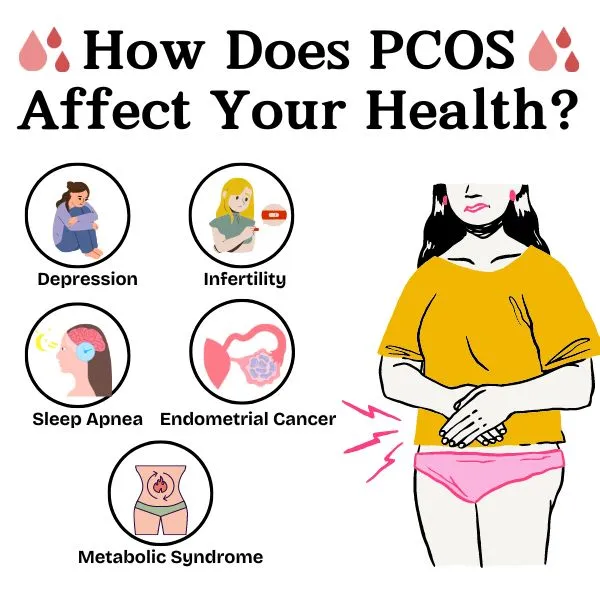
How can PCOS increase infertility
Polycystic ovary syndrome (PCOS) is a common hormonal issue in women who can get pregnant. It usually starts in your teenage years, but the symptoms can come and go. PCOS affects your hormones, making your periods irregular and causing your body to produce more of a male hormone called androgen. It can also lead to cysts on your ovaries.
These irregular periods, often because you don’t ovulate every month, can make it harder to get pregnant. In fact, PCOS is one of the main reasons why some women have trouble conceiving. There is no cure for PCOS, but it is manageable. By making healthy lifestyle choices, taking medication if needed, and exploring fertility treatments, you can improve your chances of getting pregnant. We don’t know exactly what causes PCOS, but it is more common if someone in your family has it or if you have type 2 diabetes.
Nutrition for PCOS
Focus on whole, unprocessed foods: Prioritize fresh fruits, vegetables, whole grains, legumes, and lean proteins.
Limit refined carbohydrates: Sugary drinks, white bread, pastries, and white rice can spike blood sugar levels.
Choose healthy fats: Opt for unsaturated fats like olive oil, avocado, nuts, and seeds. Limit saturated and trans fats found in processed foods and fried items.
Control portion sizes: Practice mindful eating and use smaller plates to avoid overconsumption.
Stay hydrated: Drink plenty of water throughout the day to stay full and support overall health.
Consider a low-glycemic diet: This type of diet prioritizes foods that raise blood sugar levels slowly, helping manage insulin sensitivity.
Read food labels: Pay attention to added sugars and opt for products with lower sugar content.
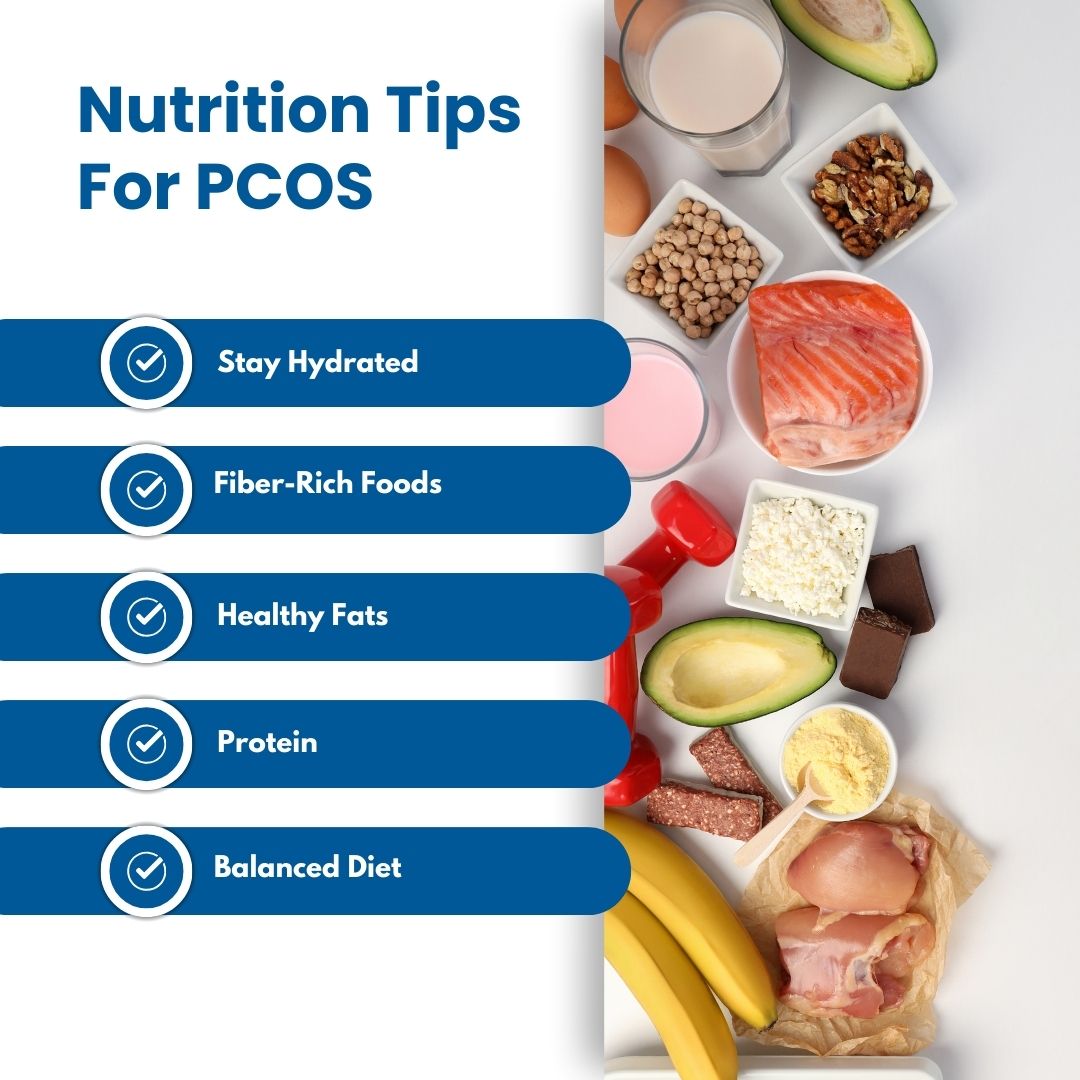
PCOS can affect mental health
Of course, if you are a PCOS patient, you may experience depression and anxiety during treatment. Individuals diagnosed with PCOS are approximately three times more likely to be diagnosed with anxiety and depression compared to those without PCOS. They are also much more likely to report symptoms of anxiety and depression, and these symptoms tend to be more severe.
Exercise for Weight Loss with PCOS
- Yoga and Meditation Yoga is highly beneficial for women with PCOS. Practicing yoga for at least one hour, three times a week, has been shown to significantly reduce levels of free testosterone and DHEA (hormones associated with PCOS). It also improves symptoms of anxiety, sadness, and menstrual cycle regulation. Studies indicate that regular yoga can be very effective for managing PCOS symptoms.
- Weight Training Weight training, also known as resistance training, involves lifting weights or using resistance bands to build strength and muscle mass. It helps to increase metabolism, burn calories, and improve insulin sensitivity, which is beneficial for women with PCOS who often struggle with weight management and insulin resistance.
- HIIT (High-Intensity Interval Training) HIIT involves short bursts of intense exercise followed by periods of rest or low-intensity exercise. It is effective for burning fat, improving cardiovascular health, and reducing insulin resistance. HIIT also leads to a phenomenon called excess post-exercise oxygen consumption (EPOC), where the body continues to burn calories even after the workout is over.
FAQ
Yes, losing weight with PCOS can be challenging due to hormonal imbalances and insulin resistance. However, a balanced diet, regular exercise, and healthy lifestyle habits can make weight loss achievable.
You can manage PCOS naturally by maintaining a healthy diet rich in whole foods, exercising regularly, managing stress, and getting enough sleep. Herbal supplements and acupuncture may also help, but consult a healthcare provider before trying new treatments.
The keto diet can help some women with PCOS by reducing insulin levels and promoting weight loss. However, it might not be suitable for everyone. It’s best to consult with a healthcare provider before starting any new diet.
The ultimate diet for PCOS includes whole foods like vegetables, fruits, lean proteins, and healthy fats. It’s important to avoid sugary and processed foods, and to choose high-fiber and low-glycemic index foods to help manage insulin levels.
Yes, you can drink milk if you have PCOS, but it’s best to do so in moderation. Some women with PCOS might find that milk increases their insulin levels or causes digestive issues, so it’s important to pay attention to how your body reacts. If you have concerns, try alternatives like almond or soy milk.


